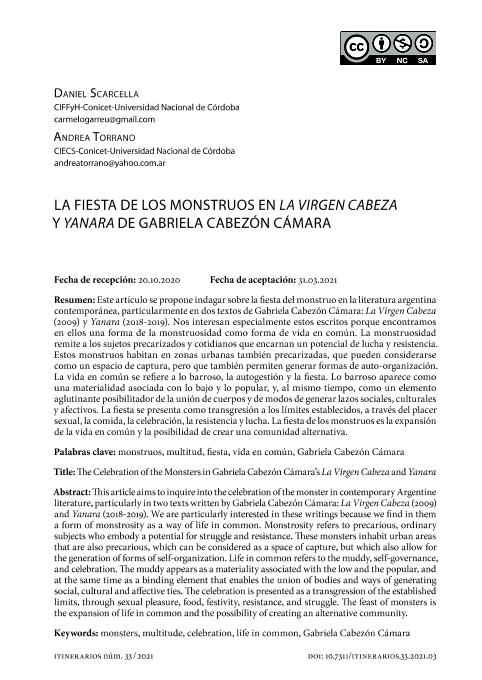Mostrar el registro sencillo del ítem
dc.contributor.author
Scarcella, Daniel Carmelo

dc.contributor.author
Torrano, María Andrea

dc.date.available
2022-07-08T00:41:18Z
dc.date.issued
2021-12
dc.identifier.citation
Scarcella, Daniel Carmelo; Torrano, María Andrea; La fiesta de los monstruos en La Virgen Cabeza y Yanara de Gabriela Cabezón Cámara; University of Warsaw; Itinerarios; 33; 12-2021; 45-63
dc.identifier.issn
1507-7241
dc.identifier.uri
http://hdl.handle.net/11336/161644
dc.description.abstract
Este artículo se propone indagar sobre la fiesta del monstruo en la literatura argentina contemporánea, particularmente en dos textos de Gabriela Cabezón Cámara: La Virgen Cabeza (2009) y Yanara (2018-2019). Nos interesan especialmente estos escritos porque encontramos en ellos una forma de la monstruosidad como forma de vida en común. La monstruosidad remite a los sujetos precarizados y cotidianos que encarnan un potencial de lucha y resistencia. Estos monstruos habitan en zonas urbanas también precarizadas, que pueden considerarse como un espacio de captura, pero que también permiten generar formas de auto-organización. La vida en común se refiere a lo barroso, la autogestión y la fiesta. Lo barroso aparece como una materialidad asociada con lo bajo y lo popular, y, al mismo tiempo, como un elemento aglutinante posibilitador de la unión de cuerpos y de modos de generar lazos sociales, culturales y afectivos. La fiesta se presenta como transgresión a los límites establecidos, a través del placer sexual, la comida, la celebración, la resistencia y lucha. La fiesta de los monstruos es la expansión de la vida en común y la posibilidad de crear una comunidad alternativa.
dc.description.abstract
This article aims to inquire into the celebration of the monster in contemporary Argentine literature, particularly in two texts written by Gabriela Cabezón Cámara: La Virgen Cabeza (2009) and Yanara (2018-2019). We are particularly interested in these writings because we find in them a form of monstrosity as a way of life in common. Monstrosity refers to precarious, ordinary subjects who embody a potential for struggle and resistance. These monsters inhabit urban areas that are also precarious, which can be considered as a space of capture, but which also allow for the generation of forms of self-organization. Life in common refers to the muddy, self-governance, and celebration. The muddy appears as a materiality associated with the low and the popular, and at the same time as a binding element that enables the union of bodies and ways of generating social, cultural and affective ties. The celebration is presented as a transgression of the established limits, through sexual pleasure, food, festivity, resistance, and struggle. The feast of monsters is the expansion of life in common and the possibility of creating an alternative community.
dc.format
application/pdf
dc.language.iso
spa
dc.publisher
University of Warsaw
dc.rights
info:eu-repo/semantics/openAccess
dc.rights.uri
https://creativecommons.org/licenses/by-nc-sa/2.5/ar/
dc.subject
MONSTRUOS
dc.subject
MULTITUD
dc.subject
FIESTA
dc.subject
GABRIELA CABEZÓN CÁMARA
dc.subject
VIDA EN COMÚN
dc.subject.classification
Teoría Literaria

dc.subject.classification
Lengua y Literatura

dc.subject.classification
HUMANIDADES

dc.title
La fiesta de los monstruos en La Virgen Cabeza y Yanara de Gabriela Cabezón Cámara
dc.title
The Celebration of the Monsters in Gabriela Cabezón Cámara’s LaVirgen Cabeza and Yanara
dc.type
info:eu-repo/semantics/article
dc.type
info:ar-repo/semantics/artículo
dc.type
info:eu-repo/semantics/publishedVersion
dc.date.updated
2022-05-12T07:02:20Z
dc.journal.number
33
dc.journal.pagination
45-63
dc.journal.pais
Polonia

dc.journal.ciudad
Varsovia
dc.description.fil
Fil: Scarcella, Daniel Carmelo. Universidad Nacional de Córdoba. Facultad de Filosofía y Humanidades. Centro de Investigaciones María Saleme Burnichón; Argentina. Consejo Nacional de Investigaciones Científicas y Técnicas. Centro Científico Tecnológico Conicet - Córdoba; Argentina
dc.description.fil
Fil: Torrano, María Andrea. Consejo Nacional de Investigaciones Científicas y Técnicas. Centro Científico Tecnológico Conicet - Córdoba. Centro de Investigaciones y Estudios sobre Cultura y Sociedad. Universidad Nacional de Córdoba. Centro de Investigaciones y Estudios sobre Cultura y Sociedad; Argentina
dc.journal.title
Itinerarios

dc.relation.alternativeid
info:eu-repo/semantics/altIdentifier/url/https://itinerarios.uw.edu.pl/resources/html/article/details?id=222471
dc.relation.alternativeid
info:eu-repo/semantics/altIdentifier/url/https://dialnet.unirioja.es/servlet/articulo?codigo=8227260
Archivos asociados
